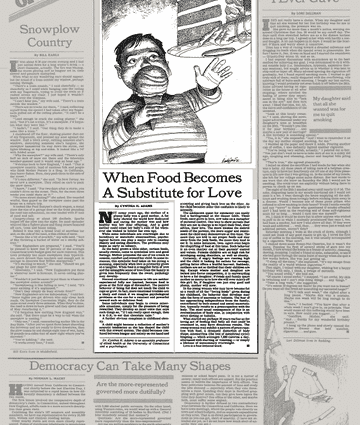All we need in childhood is a mother’s love. When the most important person in a child’s life leaves him or becomes emotionally alienated, he no longer feels supported. And this is reflected primarily in his eating behavior.
Why food? Because it is the simplest remedy that can bring instant satisfaction. We remember that food was available when we missed our parents so much. Even if it was scarce and limited.
The psychotherapist, specialist in nutritional psychology Ev Khazina notes that the image of a mother with the start of feeding a newborn is associated with satisfying hunger and survival:
“It is not for nothing that the child tries to tie his mother to himself as tightly as possible. This is a metaphor for recreating the lost paradise of prenatal development. We strive to preserve and extend it to the future. But it must be borne in mind that parents can only provide their child with the level of satisfaction that they themselves have accumulated. Parental deficits in love and acceptance are hereditary.»
Research confirms that children deprived of motherly love seem to feel hungry. The result is displacement: the emotional emptiness in the realm of love pushes us into the simple act of seeking solace in food.
Subtle matter of love
Gary Chapman’s The Five Love Languages (Bright Books, 2020) presents an emotional model of love that includes:
support,
care
self-sacrifice,
approval,
physical touch.
Without a doubt, we can add a sixth love language to this list — food. We remember and appreciate this language of mother’s love all our lives. Unfortunately, families are different. Ev Khazina is sure that the lack of parental love responds in adult life with eating disorders. Overweight men and women often recall that in childhood they did not feel much care and support.
Growing up, deprived of love and care, children begin to compensate for harsh prohibitions by eating alienation with something sweet. Such a desire to “get” maternal love is quite understandable, the expert believes: “Growing up and self-serving himself, the child discovers that “the mother who is not around” can be easily replaced with food “which is always available”. Since in the mind of a child, mother and food are almost identical, then food becomes a great simple solution.
If the mother was toxic and unbearable, then food, as a saving substitute, could become a protection against such contact.
How to disenchant a mother’s embrace of food
If we feel that we are replacing the love of loved ones with food, then the time has come to act. What can be done? The therapist suggests doing seven steps to help transform emotional eating into a «sober relationship with food.»
Understand the origin of your stress eating habit. Consider: when did it start, under what circumstances of life, what dramas and anxiety associated with them underlie this avoidance behavior?
Assess the actions needed to change. Ask yourself what benefits will change bring? Write down the answer.
Make a list of possible actions that will replace overeating. It can be a rest, a walk, a shower, a short meditation, a workout.
Meet face to face with your main Critic. Get to know him like an old friend. Analyze, whose voice from your past belongs to the Critic? What can you, an adult, answer to his claims and depreciation?
Do what you fear every day. First imagine doing it in your mind. Then implement in real life.
Praise, acknowledge, reward yourself for every risky step you take. But not food!
Remember, emotional eating is the prerogative of a child, not the adult and responsible person that you are now. Give an adult rebuff to the topics of life that are stressful for you and watch the miracles that are sure to enter your life.










